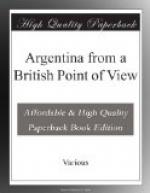Amongst table birds there are grey pheasants, martinetta, and partridges. Of wild fowl, there are enormous varieties, including the “pato real” or great tree duck, whistling mallard, various kinds of teal and shovellers, widgeon, muscony and hooded duck, black-headed geese, grey geese, and swans. Amongst water-birds are the black, grey, and white “garza” or heron. The latter are especially valuable on account of the splendid feathers on the back of their necks. Of the smaller birds there is the gallinetta, a kind of landrail, the curse of hunters shooting wild duck, their wretched screech warning every bird in the district. The beautifully coloured and almost transparently winged golden moorhen covers every stretch of water inland, and the “chaja” or wild turkey, one of the most useless birds in the Chaco, and quite uneatable, sends forth his dismal cry “chaja.”
The kingfishers are, perhaps, the most noticeable of all the river birds, and are of all sizes, from the small European variety to one almost ten times their size. Gorgeously plumaged, they skim, like flashes of light, over the water, which is full of all kinds of fish including “Dorado,” a splendid fighting fish, excellent eating, which can be caught with rod or fly, and goes up to 10 kilos in weight; “Suravi,” a great mud fish, which is seen sometimes basking out of water, weighing up to 50 kilos, with enormous head, and good eating; “Savala,” the mud-eating cruiser, which one sees nearly always with its tail out of water, and which makes excellent revolver shooting; “Palmieta,” the curse of the Chaco streams and rivers, making bathing unadvisable on account of its hostile assaults on the extremities of all foreign bodies; and the “rallo,” or sun fish, a large flat fish with a long tail.
Thus was spent a week of happy days of excursions and explorations, where sometimes we had to walk through great distances of undergrowth and the everywhere-abundant prickly cactus, cutting our way with large cavalry swords, always with our eyes skinned to catch sight of some strange bird, beast, or flower. Sometimes we waded for miles through swamps, which, in some places, abound with enormous water snakes up to 6 metres long.
We put up all kinds of water-fowl, as we struggled on, splashing through rivers, clambering up and skeltering down slippery banks, reaching home tired and weary every night to recount all the day’s doings, sitting out in the patio in the cool evening, eaten up by mosquitoes.
So ended my holiday, with hurried packing, much toast-drinking, and a final little farewell dance to the accompaniment of guitar, gramophone, mouth-organ, and accordion. The journey south was of no great interest, half on horseback, half in “galera,” or public mail coach, with, as fellow passengers, a German traveller, a cure (most jovial of beings, who had brought enough food with him to feed a whole regiment), a head of police and his men, and two coach boys.




